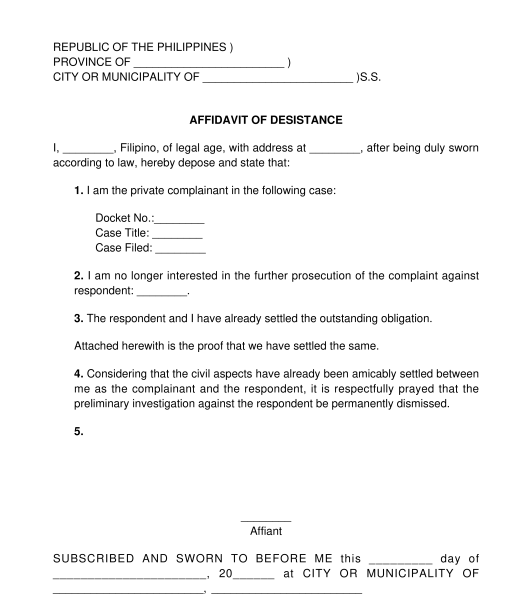 10/31/2025
10/31/2025

Answer a few questions and your document is created automatically.

Your document is ready! You will receive it in Word and PDF formats. You will be able to modify it.

 10/31/2025
10/31/2025
 Word and PDF
Word and PDF
 1 page
1 page
An Affidavit of Desistance is a document that sets forth the desire of a person called the affiant to desist from pursuing a particular case that is already filed against a certain person called the respondent, especially in criminal cases.
In this affidavit, the affiant will include in a sworn statement, the circumstances of the case which he no longer wants to pursue. This may include the reasons as to why the affiant is desisting from pursuing the case, and the actions taken to arrive at such decision.
To request the dismissal of the case, this document is submitted to the fiscal or the officer handling the investigation of the case (This stage of the case is called preliminary investigation), or the court where the case is pending (if the case is already being handled by the court after a preliminary investigation).
The act of the affiant in desisting through this affidavit can be made at any point after its filing until he has given his testimony in court. Once his testimony is already given, an affidavit of desistance can no longer be used by the affiant, instead, an affidavit of recantation should be used where the affiant will recant or withdraw the statements previously made in a testimony.
It must be noted that the submission of this affidavit does not automatically dismiss the case, as the dismissal of the case will ultimately be subject to the discretion and decision of the handling fiscal, officer, or court.
An Affidavit of Desistance contains the following information:
The necessary attachments to this affidavit may vary as follows:
After completing the affidavit, at least two copies must be printed. Then both copies must be presented and signed in front of a notary public for notarization. One copy will be given to the notary public, and the other will be kept by the affiant and may be used for its intended purpose.
Affidavits are governed by the 2004 Rules on Notarial Practice. It should also be noted that making untruthful statements in a notarized affidavit may be punishable under the Revised Penal Code of the Philippines.
You fill out a form. The document is created before your eyes as you respond to the questions.
At the end, you receive it in Word and PDF formats. You can modify it and reuse it.
Guides to help you
Affidavit of Desistance - sample template
Country: Philippines